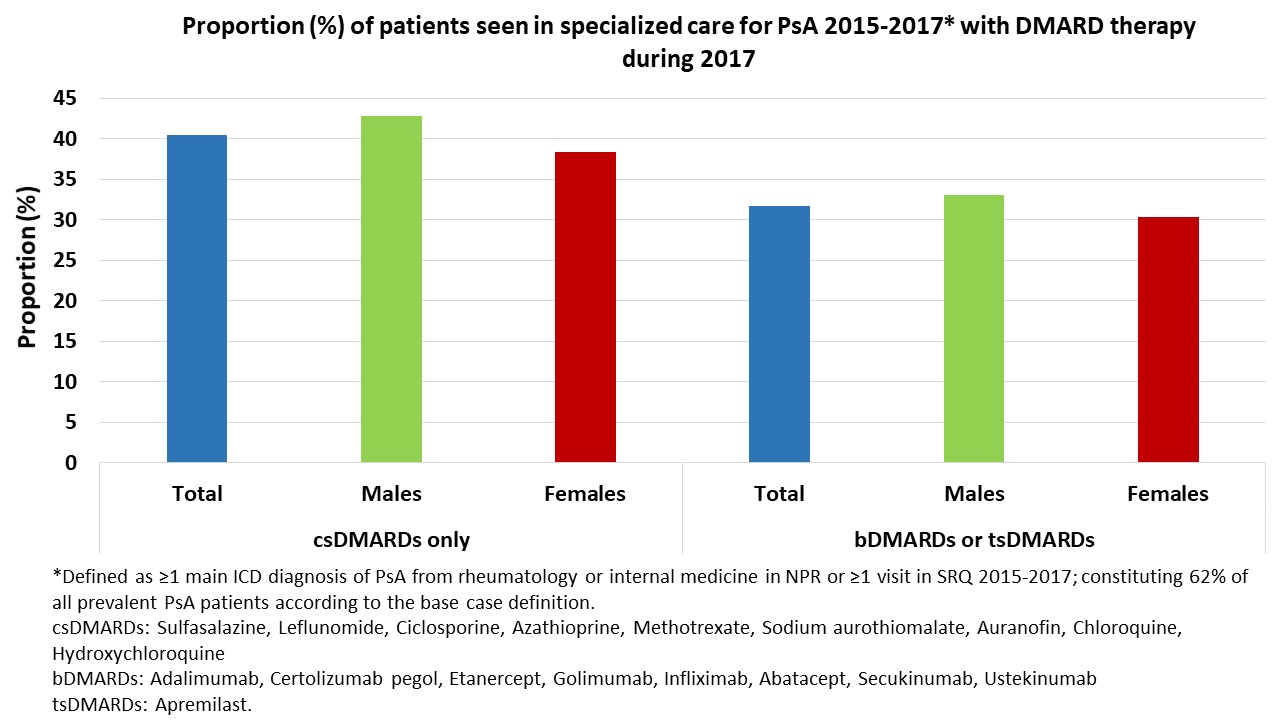Session Information
Date: Sunday, November 8, 2020
Title: Epidemiology & Public Health Poster III: Inflammatory Rheumatic Disease
Session Type: Poster Session C
Session Time: 9:00AM-11:00AM
Background/Purpose: Reported prevalence estimates of psoriatic arthritis (PsA) vary considerably, with few nationwide figures. This study aimed to estimate the prevalence of PsA among adults (18-79 years (y)) in Sweden 2017, overall, stratified by sex/age/education, and with contemporary need of specialized care, respectively. In the latter group, the proportion treated with disease-modifying anti-rheumatic drugs (DMARDs) was also assessed.
Methods: All individuals, 18-79y, alive and residing in Sweden on December 31, 2017, who had been seen in specialized care for clinically diagnosed PsA 1964-2017 were identified from 2 separate, overlapping sources: 1) individuals with ≥1 registered ICD diagnosis of PsA from out-/inpatient visits in the Swedish National Patient Register (NPR); 2) individuals registered with PsA in the Swedish Rheumatology Quality Register (SRQ). Data on the total Swedish population 2017, demographics, education (for individuals ≥30y), and treatments were retrieved from other registers. The base case (BC) PsA definition for prevalence estimation was ≥1 main ICD diagnosis of PsA (ICD-8:696.00; ICD-9:696A; ICD-10:L40.5/M07.0-M07.3) from a department of rheumatology or internal medicine (IM) in NPR, or a PsA diagnosis in SRQ. Sensitivity analysis definitions were: A) Liberal: ≥1 main or secondary ICD diagnosis of PsA from any department in NPR, or a PsA diagnosis in SRQ; B) As BC, but reducing the number of cases in line with a prior validation of the BC definition in which 86% of 400 cases fulfilled PsA classification criteria; C) As BC, but excluding cases with ≥1 main ICD diagnosis of rheumatoid arthritis from rheumatology or IM in NPR; D) Strict: ≥2 ICD diagnoses of PsA in NPR, of which ≥1 as main diagnosis from rheumatology or IM. Furthermore, the prevalence of PsA with contemporary need of specialized care was estimated by restricting the BC definition to 2015-2017 (≥1 main ICD diagnosis of PsA from rheumatology or IM in NPR or ≥1 visit in SRQ 2015-2017), and the proportion of this population with DMARD therapy in 2017 was assessed.
Results: A total of 29 359 cases, 18-79y, alive and residing in Sweden on December 31, 2017, with clinically diagnosed PsA according to the BC definition were identified, resulting in a national, prevalence of PsA in the adult (18-79y) population of 0.39%. Corresponding sensitivity analysis estimates ranged from 0.32-0.50%, with a validation-adjusted BC prevalence of 0.34% (Figure 1). Irrespective of age group, the PsA prevalence was numerically higher among females (Figure 2). Higher education was associated with numerically lower PsA prevalence ( >12y education: 0.38%; 10-12y:0.58%; ≤9y:0.54%, in adults ≥30y; BC PsA definition). The prevalence of PsA seen in specialized care 2015-2017 was estimated at 0.24%. In this population, 32% received biologic or targeted synthetic DMARDs, and 41% conventional synthetic DMARDs only, during 2017 (Figure 3).
Conclusion: The national prevalence of clinically diagnosed PsA in the adult (18-79y) Swedish population in 2017 was estimated at around 0.35% (0.32-0.39% across most definitions). Among the 62% of these patients who were seen in specialized care for PsA during the last 3 years of our study period, almost 3/4 received DMARD therapy in 2017.
To cite this abstract in AMA style:
Exarchou S, K. Wallman J, Di Giuseppe D, Alenius G, Klingberg E, Sigurdardottir V, Wedrén S, Lindström U, Turesson C, Jacobsson L, Askling J. The National Prevalence of Clinically Diagnosed Psoriatic Arthritis in Sweden 2017 [abstract]. Arthritis Rheumatol. 2020; 72 (suppl 10). https://acrabstracts.org/abstract/the-national-prevalence-of-clinically-diagnosed-psoriatic-arthritis-in-sweden-2017/. Accessed .« Back to ACR Convergence 2020
ACR Meeting Abstracts - https://acrabstracts.org/abstract/the-national-prevalence-of-clinically-diagnosed-psoriatic-arthritis-in-sweden-2017/



